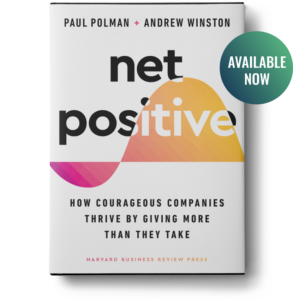[Here’s a short piece that appears in a new e-book from nexxworks, “On Building a Better Future,” with contributions from really interesting people with a wide range of perspectives.]
Over the last two years, the role of business in society has shifted dramatically. For multinationals in particular, the idea of solely maximizing earnings, while mostly avoiding politics or what’s going on in the wider world, has become untenable.
The pressure on corporate leaders to say something honest and clear about the world’s great environmental and social challenges is intense…and it’s rising. The pandemic accelerated these trends, and historic tipping-point moments in the U.S. – such as the killing of George Floyd and the attempted insurrection on January 6, 2021 – changed the equation for speaking out versus staying silent.
I’ve been advocating for change on how business sees itself and its approach to strategy for 20 years, and even I’ve been surprised by the speed of change. For example, racially-motivated killings were tragically not new. But then, as the Black Lives Matter movement grew (and spread beyond the U.S. to global protests on racial equity), it seemed as if every organization felt compelled to say something about their commitment to justice. And in the days following the overthrow attempt at the U.S. Capitol, dozens of multinationals pulled funding from either all politicians, or just the ones that voted to block the election results. Since that latter group was all Republicans, companies were effectively picking a team, something they never did before.
These moments of moral choice are unlikely to be the last. In 2022, and beyond, we should see companies face more questions about their values. Their stakeholders – communities, customers and consumers, and especially current and prospective employees – are looking to business to step up. The Edelman 2021 Trust Barometer was revealing on this front. More than two-thirds of those surveyed expect CEOs to fill the void left by government, and fully 86% are “looking for CEOs to lead on such issues as the pandemic’s impact, job loss due to automation and broader societal issues, like climate change and the continuing struggle for racial justice.”
Clearly, companies can’t speak out aggressively on everything. But neither can they fully decide for themselves which issues they should have a position on. Stakeholders will help make that call, and transparency will increasingly be the norm. If employees want their companies to demonstrate their values, they will ask. Recently, 1,000 employees at consulting giant McKinsey issued a public statement about their employer’s work with fossil fuel companies. They demanded that the company disclose the carbon footprint of their clients, and called for a more systemic view of all the company does. Calling climate change the defining issue of their generation (of any generation I’d say), these vocal young consultants pointed out that “our positive impact in other realms will mean nothing if we do not act as our clients alter the earth irrevocably.”
What these employees understand well is that a company’s responsibility for how it impacts the world does not remotely stop at the company’s doors. This level of ownership is the core principle of the kind of company we now need to build, one that improves the well-being of everyone it touches (an idea I explore fully in my new book, written with legendary CEO Paul Polman, Net Positive: How Courageous Companies Thrive by Giving More Than They Take).
Seeking to become net positive and thrive by serving the world is leading edge…for now. As we’ve seen, what was once “out there” can quickly become table stakes. Very few companies had net zero or science-based carbon goals 5 years ago. Now it’s thousands. So don’t wait for stakeholders to force you down this path of taking more ownership of your impacts – be proactive and get ready for 2022 and beyond.
______
Follow Andrew on Twitter
Subscribe to get Andrew’s articles through his blog


